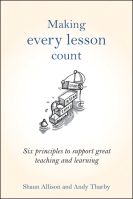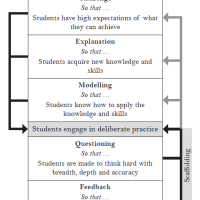Tonight’s 15 Minute Forum was led by science teacher Bex Owen. Bex started by outlining how, over a year or so ago, she had reflected on her own practice and identified the following issues:
- I was teaching lots of physics triple classes and a number of students in these classes were high ability (my specialism was biology)
- My projections were much lower than more experienced physics teachers.
- Felt uncomfortable with my explanations of tricky abstract concepts.
- Didn’t know all of the science behind the topics I was teaching.
As a result, Bex felt very insecure teaching topics that she hadn’t covered herself for a number of years. She was covering the basics, but felt unable to really push the students and felt anxious when they came across difficult questions. She felt her students were not getting a good deal – which frustrated her professionally, because she really cared about their progress.
Whilst a lot of CPD focused on general pedagogy development, Bex found this frustrating as she knew that this was not addressing the issue that was affecting her teaching – her subject knowledge. To quote Bex:
“It’s difficult to enthuse students if you don’t love your subject. You’ve got be passionate about your subject and be in love with it!”
Bex then described some of the things that helped her fall in love with physics!
Get support from an expert
The school was able to secure some support from the ‘Institute of Physics’ in the shape of a superb ‘Teaching & Learning Coach’ Colin Piper. Colin was a fantastic resource. He met with Bex on a regular basis, went through the topics she was going to be teaching at a very high level, broke it down and explained the best way to teach it. He would also discuss misconceptions and how to address them, as well as unusual and interesting practicals and demonstrations to support her explanations.
Now, sadly we can’t all find a Colin, but within your school there will be colleagues with a huge amount of expertise – use them! Alternatively, look for experts in other local schools. Most teachers are happy to give their time to support their colleagues.
The science department have made this easier by assigning an ‘expert’ to each section of the scheme of the work. This is the person to go to, for advice and guidance on teaching that particular topic.
Bex has put together this list of subject organisations who might be able to help:
- National Association of English Teachers – https://www.nate.org.uk/
- Association for Teachers of Maths – http://www.atm.org.uk/
- Association for Science Education – http://www.ase.org.uk/home/
- Geographical Association – http://www.geography.org.uk/
- The historical association – http://www.history.org.uk/
- Association of Physical Education – http://www.afpe.org.uk/
- Design & technology association – https://www.data.org.uk/
- Association for citizenship teaching – http://www.teachingcitizenship.org.uk/
- Association for Language Learning – http://www.all-languages.org.uk/
And of course twitter is a great source of support!
Know your specification
Make sure you read and know your GCSE specification, inside out. Print a copy and keep it in your planner at all times – and refer to it. This makes sure that you are covering all aspects of the content, to the correct level.
The science department have re-written their KS4 schemes of work and incorporated the exact detail of the specification into it – so it is very clear precisely what you need to be covering during each teaching episode.
Know your exam
Bex has made herself sit the higher exam papers, scrutinise the mark schemes and then mark them. This not only reassures her about her own subject knowledge but it also ensures that she knows exactly how the students will need to apply their knowledge – which then informs her teaching.
Observe colleagues
Find out who is really great at teaching particular topics and go and watch them teaching it. The science department is building a culture of professional peer learning, by pairs of teachers going around lessons and collating good teaching ideas from their colleagues – magpie observations.
Subject specific CPD
The science department are running subject 15 minute forums. Science teachers take it in turns to share with their colleagues how they teach a particularly difficult topic – again focusing on the tricky bits that ‘stick’ students and common misconceptions.
As a school, we will be developing this idea of subject specific CPD during INSET days…watch this space!
Bex finished by describing how this has helped her development:
- Massively improved confidence in lessons/assessing students etc. Now feel totally confident when tackling really difficult questions with students – in fact she positivelt relishes the really difficult questions!
- During observations, she is now always complimented on the clarity of her explanations.
- Improved student progress and attainment, especially being able to challenge higher ability students – great GCSE results last year!
- Improved understanding, makes it easier to break a topic/concept down for lower ability students.
- My confidence in my subject, makes my students feel confident about my teaching and their learning. Students know when you are ‘winging it’!
- A much happier teacher, who has fallen back in love with her subject and now doesn’t want to teach anything other than physics!












Reblogged this on The Echo Chamber.
You can find a Colin!
(disclaimer: I work with Colin at the IOP, and run the @TakeOnPhysics twitter account)
He’s a Teaching and Learning Coach with our Stimulating Physics Network – a DfE-funded programme that provides free CPD for everyone teaching physics outside their subject specialism.
You can find more about the Network at http://www.stimulatingphysics.org, and join us at http://www.stimulatingphysics.org/join.htm.
Why would anyone want to teach anything other than physics? Conceptually, so challenging, but then so wonderful when you see the wood for the trees; many congratulations, Bex!
Actually, everyone can have a Colin Piper – or the equivalent – for free. Look here http://www.stimulatingphysics.org/join.htm
Even better, for any science teachers needing to boost subject knowledge in physics (and chem) outside their specialism, there are SKE+ courses, which are fully funded but require school support and days out. We run them @Sotonmslc http://www.southampton.ac.uk/education/cpd/subject_knowledge_enhancement_plus.page but they’re available elsewhere too.
Pingback: Blog of the week | 18th October 2015 | Never Stop Learning
Pingback: CPD – Now it’s personal… | Class Teaching
Pingback: Another Six Things – Stretching the High Starters | Class Teaching